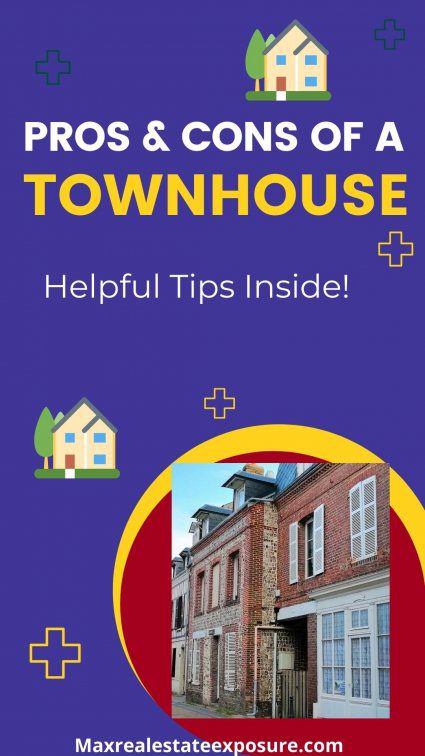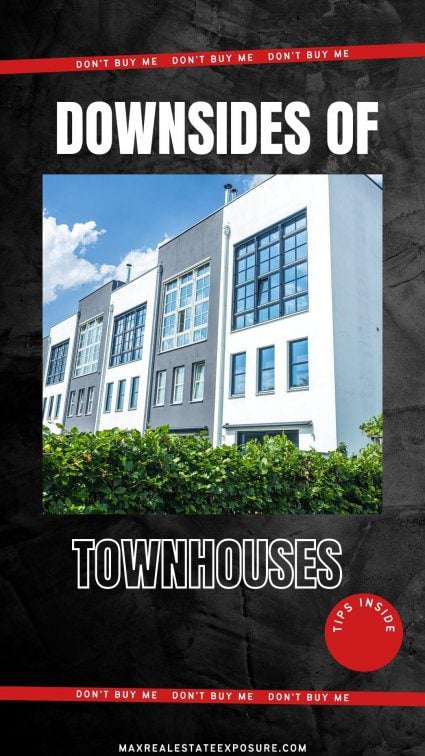 If you consider buying a townhouse for your next home, there are different factors to think about compared to single-family homes.
If you consider buying a townhouse for your next home, there are different factors to think about compared to single-family homes.
You need to know that the pros and cons of a townhouse suit your lifestyle before you make an offer on this type of home.
Single-family homes are different than townhouses. A traditional house will be different because you will not be sharing a common wall with other townhouse owners. A detached house is freestanding, usually on a lot that belongs to the homeowner.
The square footage of single-family houses can vary, whereas townhome owners usually have more uniform properties. Townhouses differ from condos, even more so than single-family houses.
One of the key differences between condos and townhouses is owning the land with a townhouse. With condos, the land is communally owned.
It is essential to understand the similarities and differences to make a wise decision for your lifestyle. Both condos and townhouses tend to have common areas and a homeowner’s association in charge of upkeep for these areas within a townhome community.
One of the other vital things an HOA does is enforce the HOA rules.
To help you make sure you are buying the correct type of home, let’s take a careful look at the townhouse’s pros and cons.
What Are Townhouses Exactly?
Many folks ask real estate agents or do an online search for “what is a townhouse?” Townhouses are homes that share one or two walls with neighboring properties. They are often referred to as communal walls.
It is not a surprise as it becomes a shared divider between yourself and someone next door.
The living space will be over multiple floors, and you will have a separate entrance and possibly yard space, a garage, and a basement.
While sometimes referred to as row houses, the definition of townhouses is slightly different. Typically row houses are constructed in a line and run the length of the block, whereas townhouses have more flexible configurations.
A rowhouse tends to be identical to one another. A townhome, on the other hand, could have more architectural differences.
The idea of townhouses stretches back many centuries to England when wealthy landowners or even royalty would keep a home in town. The term “in town” would usually mean an upmarket part of London and the origin of the term townhouse or townhome.
The words townhouse and townhome are interchangeable and have the same meaning.
The Pros and Cons of a Townhouse Explained
Before you take the plunge and make an offer on a townhouse, consider the advantages and disadvantages.
The Advantages of a Townhouse
 Let’s take at the list of pros. These are the benefits you can expect when buying a townhome.
Let’s take at the list of pros. These are the benefits you can expect when buying a townhome.
Townhomes Are Usually More Affordable
In general, townhouses are cheaper than similar-sized detached properties. This is thanks to the home taking up less space, requiring a smaller lot, and sharing walls with neighboring properties. In this respect, condominiums are similar to townhomes.
Townhomes make better use of a smaller lot than a detached single-family home. Because of the niche, this type of home fills, you only see them in certain parts of the country and specific situations.
For example, they are more likely to be found in areas transitioning from urban to suburban. Townhouses can be very popular in rural areas. They are less likely to be found in urban areas where land is hard to come by.
It could be a good choice if you want to maximize your budget when buying a home. You will still get the rooms and the space you need, but without requiring such a large down payment.
Townhomes are often a great option for first-time homebuyers, young professionals, and young families.
Fully Owning Your Property
Unlike a condo, where you only own the interior, you own the outside spaces and the interior of a townhouse. The combined land ownership gives you more scope to make changes you want, which wouldn’t be possible with a condo.
Despite having more options with a townhouse, you might still have to follow homeowners’ association rules.
The HOA covenants might restrict the things you can do to the outside of the property, but they’ll also prevent your neighbors from altering the neighborhood’s style too much either.
Continuity can positively affect resale values and ensure the area continues to be a nice place to live.
Possibly Fewer Exterior Maintenance Responsibilities
When you own a detached single-family home, responsibility for exterior maintenance will fall entirely on you. But if you buy a townhouse within an HOA, they might take care of some of the maintenance of the outside of the property. Doing so might only leave the interior for you to worry about.
Sometimes but not always, things such as lawn care and snow removal remain with the owner in a townhouse community. It will be a good idea to on these maintenance costs as they can add up when there are large private outdoor spaces. If you want lower maintenance, a condo may be a better option.
Even if the HOA does not cover much maintenance, you still have fewer walls to maintain. Overall, this should mean fewer maintenance problems for you to worry about, as well as expenses.
Townhomes Might Have Community Facilities
Townhouse communities are more likely to benefit from facilities that wouldn’t usually be available in most single-family developments. These HOA-maintained facilities could include a swimming pool, fitness center, clubhouse, tennis courts, gym, and more.
These amenities will undoubtedly enhance many people’s lives and will be valuable as long as you don’t mind sharing with other members of your townhome community.
Community Living
Thanks to having community facilities and physically living closer to your neighbors, there should be a better sense of camaraderie. If you like socializing, living in a community like this should expand your circle of friends.
One of the benefits of townhouse developments is that they make you feel like part of a community. Common spaces to use tend to do that.
The Security is Usually Good
If you don’t expect to be living in the home full-time or be away for weeks at a time, living in this type of development could be better. If the HOA takes care of things like mowing the lawn or pest control, it’s something you won’t have to worry about if you’re not in the home for a few months.
Thanks to a close-knit community, your neighbors should offer better security as well. If a stranger is on your property when you’re not home, there’s a better chance that one of your neighbors will notice.
It’s one of those property types where you can feel more at ease when going away.
With a detached home, there is more of a risk that a burglar will be able to gain entry to your home without being noticed. It will also be more evident that no one is currently living in the home if the grass hasn’t been trimmed.
A Better Choice For Busy Families?
If you’re a busy family, you already have lots of responsibilities to cope with without having to maintain the front yard. If the townhouse is part of an HOA community that deals with garden chores, this is one less thing you’ll have to deal with.
The extra amenities that might be available in this type of community could also benefit families without any additional responsibility. The exterior of your home might not be something you need to be a slave to.
The Disadvantages of a Townhouse
 Let’s take a look at the list of cons. These are the downsides to consider when purchasing a townhome.
Let’s take a look at the list of cons. These are the downsides to consider when purchasing a townhome.
Unruly Homeowners Association
One of the most significant cons of living in a townhouse community is an overbearing HOA. Townhouse owners can quickly discover they can make your life miserable. This is where the townhouse vs. house debate can lean heavily towards homeownership.
Being part of a homeowners association doesn’t always have pros that outweigh the cons.
When buying a condominium or a townhouse, always make sure you ask a ton of questions. It is highly advisable to speak to some people already living within the townhome community to get their opinions.
You should do this before you put the property under contract.
Is the HOA helpful, or are they tough to deal with? Purchasing a townhouse is a big decision you don’t want to mess up.
Townhouses Offer Less Privacy
Since you will live closer to your neighbors than a detached property, you will inevitably have less privacy. With more neighbors close by, you will bump into them more often when you come and go from your house.
While this won’t be as big of an issue as it would be when living in a condo, it could be something that concerns you.
Nuisance Neighbors
When you are sharing walls with your neighbors, it’s more likely that you will hear them sometimes when you don’t want to. While living in this type of development can create friendly communities, you could be unlucky and have trouble with your immediate neighbors.
It is one of the disadvantages discussed in comparing condos vs single-family houses.
Neighbor Complaints
The HOA is likely to have some grievance process to deal with problems between neighbors. If you find yourself living next to someone who takes offense to something you do, they could file a complaint against you.
When you live within townhome developments, you’re more likely to need to know how to deal with a bad neighbor. Use our excellent tips for assistance if this happens.
You might be obliged to deal with this complaint as there could be serious issues if you don’t. The penalty for not dealing with something like this could mean a lien is put on your property.
HOA Fees
If the home is within a homeowners’ association, you’ll need to pay monthly HOA fees. If the townhouse community takes care of lots of maintenance, these HOA dues could be pretty expensive.
It could mean that even though you have saved money buying this type of home, the monthly fees will cancel out any savings. It would help if you looked at your purchase price and the overall cost of living.
The fact there is common area maintenance costs could make it more expensive.
Capital Contribution Fees
The monthly fee to the HOA isn’t necessarily the only expense you’ll need to pay to the association. Sometimes the bylaws of the HOA require the payment of a capital contribution.
This fee will typically need to be paid on closing and could be by around three times the monthly HOA fee or more. If this fee isn’t included in the property listing, ask your real estate agent about it before signing a purchase contract.
Potential For Special Assessment
When living in a townhouse community, you might have to pay a special assessment either when buying or in the future. A special assessment fee will cover the cost of some unexpected expenses. For example, the roof of the fitness center or the coping on the swimming pool may need replacement.
A special assessment is collected from all the owners over and above the monthly maintenance fees. These fees are often necessary when there is not enough money to cover the cost in the reserve fund.
Considering special assessments can be quite expensive, it’s worth researching. It is one of the essential real estate terms to know when making a housing purchase.
Taking The Stairs
Townhouses are often constructed in areas where land is more expensive. So to create more space inside the home, they build more floors. Some townhouses have three or four floors, perhaps with only two or three rooms on each floor. If you live in a house like this, it’s going to mean going up and downstairs a lot.
Sometimes it can be similar to living in an apartment building with multiple floors.
While you might not have any problems taking the stairs right now, this isn’t necessarily the type of house you would want to live in when you get older. While it could be possible to install an elevator, it isn’t going to be a cheap or easy option.
Slower Appreciation With Townhouses
Typically, townhouses don’t appreciate as quickly as single-family homes. The slower appreciation also means that it doesn’t fall in value quicker, so you won’t suffer so severely from housing bubbles.
So, are townhomes a good investment? If you are looking for a more stable investment instead of one that offers spectacular returns, it could be a good option. We’ll discuss townhouses as an investment in more detail shortly.
Lack of Space
As townhouses are typically constructed on smaller lots, they tend to be more compact than detached homes. Smaller square footage can mean less storage space and less living space in some cases. It is like condo ownership in this respect.
While some townhouses will have garages or basements, many do not. If you have a growing family, this lack of space could be a big problem. It could lead to your possessions and family being more tightly squeezed into the home than you might hope.
Many townhouses also don’t offer outside space for activities or storage. While this will be less of a problem if the community has a playground or small park, it is still something you need to consider.
Will You Be Able to Rent
When you are part of an HOA it is possible you may not be able to rent your place. There can be a maximum amount of rentals imposed by the association.
Sometimes renting condos or townhouses is not possible if you fall into that situation. Check to see the percentage of units that are currently available to become rental properties.
You could find yourself forced into selling if you’re relocated for a job or have an empty home.
Are Townhomes a Good Investment?
 One of the more popular questions among home buyers is are townhomes suitable investments. They can be a great choice when you are on a budget and want to start building equity in a property.
One of the more popular questions among home buyers is are townhomes suitable investments. They can be a great choice when you are on a budget and want to start building equity in a property.
In some areas, the resale value might not be quite as strong as a single-family home but is still a worthwhile purchase. The local market will often dictate the type of appreciation.
If the local real estate market has traditional home buyers and real estate investors, the appreciation will tend to be more significant.
More significant appreciation can be seen in areas with a strong demand for rental properties like college towns. Many folks like to buy townhouses as a second home in a vacation destination.
Property taxes are often not outrageous unless you are buying a waterfront property. Overall townhouses are good investments unless the housing market suddenly changes direction.
Townhomes Near Me
If you are in the market to purchase a townhome, you may be wondering if there is an excellent way to find one? One of the best ways is to find an exceptional local buyer’s agent. A top real estate agent will be able to research what you’re looking for in a townhome community.
Dialed-in agents will know about all the popular communities in the area you’re looking in. When you are new to a place and haven’t settled on using a particular agent, try an online search.
A Google search such as “townhouses near me” or “townhouses near me for sale” to see nearby townhouse developments. You’re likely to see a few examples of this type of residence pop up as a general rule.
Final Thoughts on Townhomes
Hopefully, our townhouse pros and cons will have made your decision on buying this type of home easier. Buying a townhouse is particularly good for first-time buyers and those looking to downsize, but it could make a lot of sense to many other buyers as well.
If you like the sound of a home with less maintenance while benefiting from communal areas and paying less than you would for a similar-sized detached house, townhouses seem almost perfect.
As long as the downsides of this type of property aren’t too much of an issue, maybe a townhouse is right for you. It’s a big decision, so make it a good one.
About the author: The above Real Estate information about the pros and cons of a townhouse was provided by Bill Gassett, a Nationally recognized leader in his field. Bill can be reached via email at billgassett@remaxexec.com or by phone at 508-625-0191. Bill has helped people move in and out of many Metrowest towns for 35+ years.
Are you thinking of selling your home? I have a passion for Real Estate and love to share my marketing expertise!
I service Real Estate Sales in the following Metrowest MA towns: Ashland, Bellingham, Douglas, Framingham, Franklin, Grafton, Holliston, Hopkinton, Hopedale, Medway, Mendon, Milford, Millbury, Millville, Natick, Northborough, Northbridge, Shrewsbury, Southborough, Sutton, Wayland, Westborough, Whitinsville, Worcester, Upton, and Uxbridge MA.

